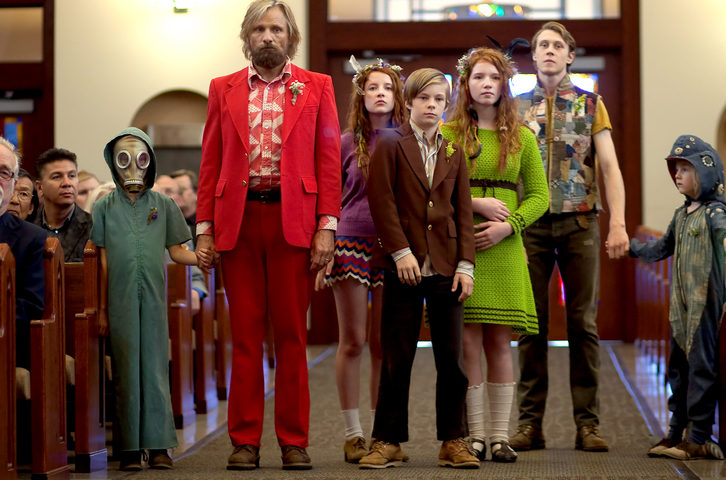
 Viggo Mortensen
(The Two Faces of January,
Appaloosa) stars as Ben Cash, a father of six (ages range from
six to eighteen), living "off the grid" in the remote dense wilderness
of the Pacific Northwest as part of some sort of self-imposed
counterculture exile, where they live off mostly of what's out in
nature in a ritualistic fashion -- hunting, farming, rock climbing,
survivalist training, and keeping physically fit, as well as mentally
agile, learning from some of the great thinkers and philosophers, some
quite revolutionary and controversial, the world has ever known.
They're all anxiously awaiting his bipolar wife Leslie to be cured of
a disease during her hospital stay back in her home town in New Mexico
when word comes that she has taken her own life. Though
father-in-law Jack (Langella, Draft Day), who blames Ben for poisoning his daughter and
grandchildren with his cultish hippie beliefs, explicitly tells him to
stay away or get arrested, he packs the family bus and the septet
vacate their bohemian digs and are off on the long road trip to crash
the funeral. The kids, who've spent their entire lives away from
any form of other civilization not found in their novels and
textbooks, find so-called civilized society to be a crazier place than
they've ever imagined.
Viggo Mortensen
(The Two Faces of January,
Appaloosa) stars as Ben Cash, a father of six (ages range from
six to eighteen), living "off the grid" in the remote dense wilderness
of the Pacific Northwest as part of some sort of self-imposed
counterculture exile, where they live off mostly of what's out in
nature in a ritualistic fashion -- hunting, farming, rock climbing,
survivalist training, and keeping physically fit, as well as mentally
agile, learning from some of the great thinkers and philosophers, some
quite revolutionary and controversial, the world has ever known.
They're all anxiously awaiting his bipolar wife Leslie to be cured of
a disease during her hospital stay back in her home town in New Mexico
when word comes that she has taken her own life. Though
father-in-law Jack (Langella, Draft Day), who blames Ben for poisoning his daughter and
grandchildren with his cultish hippie beliefs, explicitly tells him to
stay away or get arrested, he packs the family bus and the septet
vacate their bohemian digs and are off on the long road trip to crash
the funeral. The kids, who've spent their entire lives away from
any form of other civilization not found in their novels and
textbooks, find so-called civilized society to be a crazier place than
they've ever imagined.
Mortensen shines in the lead role as the leftist who "left us" to live
a life for him and his family as he sees fit, without the persistent
pressures to homogenize to a society that scorns at those who
determine to think and live differently. Ben is seen as a
sympathetic figure by us first before we can then see him through the
eyes of others who are less approving of his anti-authoritarian views
and his aggressively progressive approach to educating his children.
You begin to question what's right and what's wrong, and what's
healthy and what's harmful in terms of walking the walk when it comes
to nonconformity to the rest of society. One could say that this
is a modern take on The Mosquito Coast but with an
antireligious protagonist. Ben takes instilling autonomy and
self-fulfillment within his children to such an extreme that it
actually borders on putting them in danger quite often.
While the acting is excellent, with surprisingly raw emotional moments
nailed quite well by the children, the quirk-filled story enters into
uneven territory from time to time, most often when writer-director
Matt Ross goes for the cutes. Such things as a celebration of
"Noam Chomsky Day", in an effort to supplant Christian holidays like
Christmas (a so-called socialist philosopher in place of the most
capitalist of holidays), complete with a gift exchange of hunting
knives for all the kiddos, are cute and novel, but undercut the
ability to take the story at all as serious as Ross would like us to
take it at times. The same goes for a scene in which a heart
condition is faked in order for Ben to provide enough distraction to
allow his children to steal food from a grocery store, dubbed,
"Operation: Free the Food", in which Ben could have lost the rights to
his children in order to take a relatively paltry amount of food that
they could presumably afford with the nest egg they live off of when
necessary. Scenes of unfiltered eccentricity involving the the
consumption of a raw deer heart, the indoors shooting of a bow and
arrow, or propose marriage to the first person they develop a feeling
for feel manufactured for our immediate reaction more so than as
something that has an honest development that three-dimensional
characters might choose to partake in.
Ross's film fares far better the more he stays away from contrived
scenes of humor, especially during some of the more emotional and
downbeat moments. Though the characters can often come off as
idealized, Ross taps into touching elements nonetheless. It's
not a film full of great energy or power, but it does encroach as
affecting for its characters, especially in the children who manage to
still be kids, and desire to be so, even when Ben has been programming
them to be grown ups from birth. Whereas the kids they meet who
have grown up in society desperately want to do "adult" things, like
smoke and engage in sexual activity, Ben's kids steal moments where
they can just live carefree and fun as a child, wanting to experience
Christmas, dance, sing, and, when he's not watching, or play a video
game. Or learn a language not known by the others, such as a
scene in which the two eldest sisters speak to each other in
Esperanto, something Ben won't allow. Ben wants his children to
be independent, but if the child wants to be part of society, by their
choice, and he adamantly denies their attempt to make that decision,
can they truly claim to be independent? Ben determines that the
best way to raise is children is to dedicate every waking moment to
doing so, but the film explores that sometimes there is such a thing
as doing too much for one's children as a parent.
If you can take Captain Fantastic as a heartfelt dramedy with
momentary whimsical flights of fancy, you'll come a long way to
enjoying what is actually a unique, entertaining, and
thought-provoking film. While the moments of contrivance might
make or break the film for some, it's for the moments where the film
delves into some important life truths that makes it more than
worthwhile for those willing to see beyond the artificial attempts to
amuse to get to the genuineness of the poignant thematic material.
Though Ross is clearly sympathetic toward Ben, he's also objective
enough to see him not as an idealized man who is in the right, or Jack
as the villain who is in the wrong because he's imposing his belief
system on the daughter who rejected them, but as the complex kind of
person we all are, thinking we know the answers to how to cure the
ills of society and the only ones who truly understand the right way
to raise one's children.
Ben wants his children to be prepared for anything in life, but the
one thing he has yet to teach them, possibly because he hasn't learned
himself, is the ability to be a part of the world they are born into.
Self-determination can often lead to self-delusion if our only basis
for how to proceed is determined wholly by others. Ben thinks that the
actions that he and his children engage in are right and true, but
imagine looking at it from the perspective of Jack, and you can see
how horrific and hurtful their actions can seem to the core beliefs
and emotions of those with different points of view.
If we concentrate on making things strong in one thing, we leave
vulnerabilities in other areas. Ben instructs his children to
never use a particular word when it comes to describing something,
"interesting", but it's a hard word to avoid when it comes to the
movie where such an adjective is considered taboo, precisely because
it is so very much so. People are inherently imperfect, and so
is the movie that explores this theme -- it is only through love,
which often demands the acceptance of flaws to maintain, that we
progress into a higher plane of bliss, even if it is within the
acceptance of the flawed society in which we live. In the end,
we all do the best we can. While love is not something you can
truly feel just by reading a book, or watching a film, the ways
Captain Fantastic captures a sense of humanity on occasion makes
it seem like it could be achievable.
Qwipster's rating
:







©2016 Vince Leo

 Viggo Mortensen
(
Viggo Mortensen
(